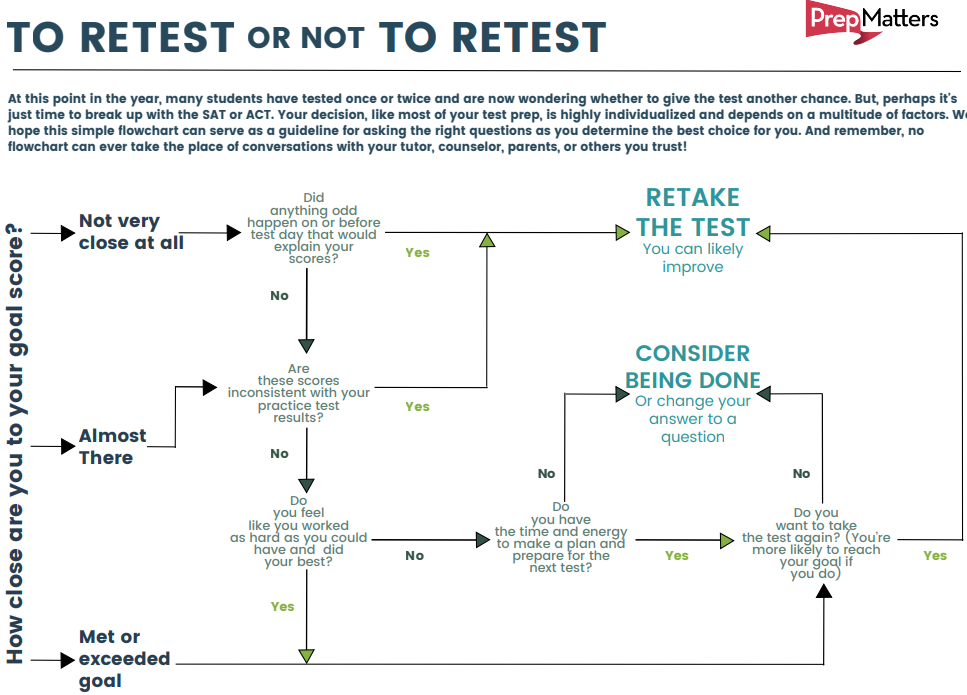Posted on: March 14, 2019
Tuesday was the first day of spring, which is great news for most people but perhaps not if you’re a high school junior. Spring brings term papers, APs, and, possibly, another go at the SAT or ACT. You likely have taken at least one test at this point and might be wondering, “Should I take it again?” That’s not always an easy question to answer, so check out our infographic below to help you ask the right questions or read on for a more detailed discussion.

How close are you to your goal score?
The first thing you’ll be thinking about, of course, is your last set of scores. If you hit your goal, congratulations! You might want to set a new goal a little higher and take the test again, or you might want to plant the flag and declare victory. Remember that admissions tests are for admissions purposes, so scores that are in the upper 25th percentile for schools on your list will usually do the trick. Looking to have bragging rights over your big brother isn’t the healthiest reason to retake the SAT or ACT, but, hey, it’s your Saturday morning and you’ve already done well!
If, on the other hand, you’re still short of your goal, you’re likely planning on retesting. Maybe that’s a great idea – but maybe not. It’s important to understand what the scores you’ve earned actually mean and whether you have a reasonable expectation of improving on the next test.
How many times have you already taken the test?
Most of our students take the test at least twice, but few students take it more than three times. If you’ve only taken it once, there’s a good chance that you’ve still got some room to push up those scores with some more experience and some more practice. If you’ve already taken the test three times and your scores are fairly consistent, you might want to think about spending your time elsewhere. Remember that the SAT and ACT don’t really measure anything beyond your ability to take a standardized test, and there are plenty of other ways to distinguish yourself to the colleges you wish to attend. Moreover, there are plenty of colleges out there that accept students with a wide range of scores; some don’t even require scores at all!
Did anything odd happen on the day or week of the test?
There are a myriad of ways to underperform on a standardized test that have nothing to do with reading, writing, or math skills. If you missed your mark by more than you were expecting, it’s worth taking stock of the day and week of the test. Did anything happen that could have adversely affected your scores? Did you simply have too many tests that week to be well rested? Still bummed out because your team didn’t make the playoffs? Sick as a dog? Get in a fight with mom over breakfast? Show up to the test to find your ex-boyfriend sitting two seats to your left? Share a snack with a friend at the break only to learn that it had peanuts in it and you’re, you know, allergic to peanuts? (You can laugh about the last two, but they actually happened to students of mine) If something happened to throw you off your game, you should definitely test again.
Were your results consistent with your practice test scores?
In many cases, however, it’s not nearly that obvious. The effects of sleep deprivation and stress are hard to self-assess if you’re sleep-deprived and stressed! One clue might be to compare your actual test results to the practice tests you’ve been taking. (You have been taking practice tests, right?) If your actual scores are consistent, terrific, but if not, that might be a sign that, for whatever reason, you didn’t have your best day and a retake might be in order.
Are you willing to put in the work?
So let’s say that your scores were consistent with your practice tests, but you still haven’t reached your goal. You should retest only if you’ve got the time and energy to make a plan and work hard for the next round. If it’s offered for your test date, order the SAT Question and Answer Service or the ACT Test Information Release to get some more feedback on questions you missed. Be sure to take more practice tests so you can target exactly what you need to do to improve. (Or take some if you didn’t before!) Do you need to bone up on grammar rules? Review your geometry? Focus on reading answer choices more literally and not reading between the lines? Get more comfortable with the pace of the sections? Simply taking the test again without doing any more preparation likely won’t get you the results you’re looking for. Prepping for tests isn’t fun, and you should consider the opportunity cost of what else you could be doing with your time.
Do you actually want to take this thing again?
After all the other considerations, it really does come down to this simple question: do you actually want to do this? Do you feel like you’ve left some points on the table and haven’t yet done your best? Or do you feel like you’ve worked really hard and improved your score as much as possible, even if you haven’t hit the goal you had in mind? There’s nothing wrong with feeling either way, but realize that mindset is important! If you think you’ve done your best and are only taking the test because you feel pressured to, it’s unlikely you’ll make much progress. But if you think you can improve and want to put some more time and effort into these tests, then you have a good chance of doing exactly that.
Best of luck to those of you who are retesting and congratulations to those of you who have put these tests behind you!





